2017四川南充中考英语真题及答案
(满分120分,考试时间100分钟)
注意事项:1. 答题前将姓名、座位号、身份证号、准考证号填在答题卡指定位置。
2. 所有解答内容均需涂、写在答题卡上。
3. 选择题须用2B 铅笔将答题卡相应题号对应选项涂黑,若需改动,须擦净另涂。
4. 非选择题在答题卡对应题号位置用0.5毫米黑色字迹笔书写。
第一部分:听力(共两节;满分20分)
第一节(共5 小题;每小题1分,满分5分) 听下面五段对话。每段对话后有一个小题, 从题中所给的A、B、
C三个选项中选出最佳选项,并在答题卡上将该项涂黑。听完每段对话后,你都有10秒钟的时间来回答有关小
题和阅读下一小题。每段对话读两遍。
1. How’s the weather today?
A. Sunny.
B. Cloudy.
C. Rainy.
2. What’s the matter with Tom?
A. He has a toothache.
B. He has a stomachache.
C. He has a headache.
3. What’s Jenny’s favorite color?
A. Black.
B. Blue.
C. Brown.
4. Whose schoolbag is this?
A. Lucy’s.
B. Lucy’s brother’s.
C. Lucy’s sister’s.
5. What time should Lily get to school?
A. At 8:00.
B. At 8:10.
C. At 8:20.
第二节(共15小题;每小题1分,满分15分) 听下面五段对话或独白。每段对话或独白后有几个小,从
题中所给的A、B、C 三个选项中选出最佳选项,并在答题卡上将该项涂黑。听每段对话或独白前,你将有时
间阅读各个小题,每小题5秒钟;听完后,各小题将给出5秒钟的作答时间。每段对话或独白读两遍。
听第6 段材料,回答第6 至第7 两个小题。现在你有10 秒钟的时间阅读下面两个小题。
6. Why does the boy want to buy a gift for his father?
A. Because his father’s birthday is coming.
B. Because Father’s Day is coming.
C. Because Mother’s Day is coming.
7. What does the boy’s father like doing?
�
A. Running.
B. Shopping.
C. Swimming.
听第7 段材料,回答第8 至第10 三个小题。现在你有15 秒钟的时间阅读下面三个小题。
8. What are Tina and Jack doing?
A. They are having lessons.
B. They are playing chess.
C. They are talking on the phone.
9. How often does Tina have art lessons?
A. Once a week.
B. Twice a week.
C. Twice a month.
10. What are they going to do next Friday evening?
A. They’re going to have dinner together.
B. They’re going to play in the garden.
C. They’re going to have a speech.
听第8 段材料,回答第11 至第13 三个小题。现在你有15 秒钟的时间阅读下面三个小题。
11. Where is Tom now?
A. In the USA.
B. In the UK.
C. In Australia.
12. When did Tom visit London Bridge?
A. Last week.
B. Last month.
C. Last Tuesday.
13. What kind of English food does Tom like?
A. Potato chips and sandwiches.
B. Salad and sandwiches.
C. Potato chips and salad.
听第9 段材料,回答第14 至第16 三个小题。现在你有15 秒钟的时间阅读下面三个小题。
14. When were Jim and Ruby in the same singing class?
A. During Grade 9.
B. During Grade 8.
C. During Grade 7.
15. What did Ruby use to do?
A. She used to help her classmates.
B. She used to be shy to show herself.
C. She used to play basketball.
16. What is Ruby more interested in now?
A. Playing tennis. B. Playing soccer. C. Reading.
听第10 段材料,回答第17至第20四个小题。现在你有20秒钟的时间阅读下面四个小题。
17. How long was Candy going to a summer camp?
A. For half a month.
B. For a month.
C. For a week.
18. How did Candy go to the camp?
�
A. By car.
B. By train.
C. By plane.
19. What did Emily ask Candy to do?
A. Ride a bike.
B. Ride a horse.
C. Feed a horse.
20. At last, how did Candy feel at the camp?
A. Awful.
B. Worried.
C. Happy.
第二部分:基础知识运用(共两节;满分25分)
第一节 单项选择(共10小题;每小题1分,满分10分) 从每小题所给的四个选项中选出最佳选项,并在答
题卡上将该项涂黑。
21. -Who’s ______boy under the tree?
-Bill. He’s ______ active boy.
A. a, an
B. a, the
C. the, a
D. the, an
22. -Are you thirsty?
-Yes, please give us _______.
A. three bottle water
B. three bottle of water
C. three bottles of water
D. three bottles of waters
23. -Your uncle is very good at cooking! How did he learn it?
-He learned it by _______ .
A. him
B. himself
C. her
D. herself
24. -I know Old Joe lives ______.
-We are supposed to visit him from time to time. Then he won’t feel _______.
A. alone, alone
B. lonely, lonely
C. lonely, alone
D. alone, lonely
25. -Look! Your teacher Miss White is over there.
-No, it can’t be her. She ______ to Beijing.
A. has gone
B. has been
C. went
D. will go
26. -Mike, let’s prepare for our baseball game.
-OK. We’ll lose the game ______ we try our best.
A. unless
B. once
C. after
D. since
27. -Mario, your mobile phone is ringing.
-Wait a minute. It’s dangerous for us ______it while crossing the street.
A. answering
B. to answer
C. answer
D. answered
�
28. -Many young people usually offer their seats to the old on the bus.
-That’s good. The old should be ______.
A. looked for
B. listened to
C. depended on
D. cared for
29. -Excuse me. Could you please tell me ______?
-Sure. Go along this street and turn left. It’s on your right.
A. when I can get to the bookstore
B. when can I get to the bookstore
C. how I can get to the bookstore
D. how can I get to the bookstore
30. -Don’t throw litter here!
- ______.
A. Yes, please
B. You’re welcome
C. Me, too
D. Sorry, I won’t
第二节 完形填空(共15 小题;每小题1分,满分15分) 先通读下面短文,掌握其大意,然后从短文后面各
题所给的选项中选出最佳选项,并在答题卡上将该项涂黑。
Suppose you find a bright yellow bike on a street corner in the city.
You hop on(跨上)it and 31
. But wait—isn’t this stealing? No, it
isn’t.
32
shouts,“Stop! Thief!” That is
33
this free ride
is just fine with the city.
You
34
find hundreds of free yellow bikes in some US cities. The idea began in Portland,
Oregon, in 1994. People saw a need for
35
transportation, and they wanted to help 36
pollution. So, to get citizens(市民)
37
their cars and onto pollution-free bikes, they
38
the Yellow Bike Project.
The
39
bikes are painted bright yellow and placed throughout the city. People can hop
on the yellow bike and ride to run errands(短程差事), to work
40
to school. Then, they leave
the bike for the
41
rider. There have been times when bikes have been stolen, but most people
42
the rules, because they think it is not wise to
43
the bike that’s already free.
Portland’s
44
was quickly loved by a lot of people. Within two years of its starts,
similar programs were
45
in cities in six other states.
31. A. drive away
B. ride away
C. ride back
D. run away
32. A. No one
B. Someone
C. Anyone
D. Everyone
33. A. whether
B. so
C. because
D. though
34. A. have to
B. don’t have to
C. can’t
D. can
�
35. A. expensive
B. crowded
C. free
D. common
36. A. protect
B. control
C. make
D. bring
37. A. out of
B. into
C. up
D. near
38. A. ended
B. started
C. changed
D. refused
39. A. public
B. private
C. clean
D. dirty
40. A. but
41. A. next
42. A. break
B. as
B. last
B. make
C. until
D. or
C. best
D. first
C. discuss
D. follow
43. A. buy
B. repair
C. produce
D. steal
44. A. citizen
B. street
C. idea
D. school
45. A. looked up
B. made up
C. put up
D. set up
第三部分:阅读理解(共两节;满分40分)
第一节 阅读所给材料,从每题所给的A、B、C、D 四个选项中,选出可以填入空白处的最佳选项,并在答题卡
上将该项涂黑。(共15小题;每小题2分,满分30分)
A
There are five exchange students in Zhao Hua’s class. Here is some information about them.
Name
Maria
Tim
Katie
Paul
James
Nationality
Date of birth
Hobby
Dream
Canada
France
Sep.2nd
Nov.3rd
Piano Basketball
Teacher
Tennis Drawing
Pilot
America
Oct.10th
Reading Swimming
Engineer
Germany
Dec.25th
Dancing Soccer
Scientist
Australia
Sep.17th
Drawing Volleyball
Doctor
46. When can Zhao Hua have a birthday party for Maria and James?
A. In November.
B. In September.
C. In December.
D. In October.
47. Where does Paul come from?
A. Australia.
B. France.
C. Canada.
D. Germany.
48. If Zhao Hua wants to learn French, who can help her?
A. Tim.
B. Maria.
C. James.
D. Katie.
49. What does Katie want to be?
�
A. A teacher.
B. A pilot.
C. An engineer.
D. A doctor.
50. What do all of them like?
A. Sports.
B. Music.
C. Art.
D. Reading.
B
We moved away from my grandmother when I was eight years old. I missed her a lot. I was her
favorite granddaughter and she was my favorite grandma.
Two years later my mother and father separated and soon divorced. I felt as if my world was
falling apart. I lived with my mother for a time, next door to my grandma and grandpa in an apartment
while my father was away during World War Ⅱ.
Grandma never had much in the way of money or material things. But it was the little things
she gave me that let me feel warm, like letting me dip my fingers in the sugar bowl, letting me
sip the coffee from her cup or allowing me to sit on the table as I had meals.
Though she didn’t have much, she did something for my brother and me. I will always remember
she saved her coins in a glass jar. I thought my grandma could have used these coins herself,
but she saved them to give us when we came to visit her.
I don’t remember how much we collected on our visits, nor was the amount(数目)important.
It was the idea that she remembered us, and cared about us when we were away from her.
51. What happened to the writer when she was eight years old?
A. She moved away from her grandma.
B. She moved away from her parents.
C. She lived with her grandparents.
D. She lived with her aunt.
52. What does the underlined word“divorced” mean in Chinese in Paragraph 2?
A. 和好
B. 打架
C. 离婚
D. 生气
53. The writer’s grandma allowed her to do many things. Which of the following is not mentioned?
A. The writer could dip her fingers in the sugar bowl.
B. The writer was allowed to sip the coffee from her grandma’s cup.
C. The writer could sit on the table while having meals.
D. The writer was allowed to collect coins in a glass jar.
54. For whom did the writer’s grandma save her coins?
A. For her son.
B. For her grandchildren.
C. For the poor.
D. For herself.
�
55. What can we learn from the passage?
A. The writer disliked her childhood.
B. The writer complained about her parents.
C. The writer missed her grandma so much.
D. The writer wanted to have her grandma’s money.
C
“Without music, life would be a mistake,” famous German philosopher(哲学家) Friendrich
Nietzsche said over a century ago. Music is a big part of our lives. But in recent years, some
US schools have cut music classes to control budgets(预算).
For example, Chicago public schools hurt arts education when it fired(解雇)over 1,000 teachers.
Among them, 10 percent of the teachers taught art or music, according to The Washington Times.
In fact, this is not just a problem in the US. In other countries, such as China and the UK, music
classes are not thought to be as important as ones like science, math and history. That’s partly
because music is not seen as a very important life skill, and it isn’t tested. Many students
are busy with schoolwork, so parents and students choose to focus on subjects that are tested
more often.
However, learning music is beneficial(有益的)in many ways.
When playing music, you need different abilities to work together. It is not as simple as
it looks, according to Kenneth Guilmartin of Music Together, an early childhood music development
program. For example, when playing the piano, people see music notes and decode(解码)them in their
brains. They also use their fingers to make sounds. You need to deal with all these things at
the same time.
Music has a special connection with science as well. You can see that many scientists are
good at playing music: Einstein played the violin, and German physicist Max Planck was talented
in playing the piano.
56. Some schools in the US cut music classes, because ______.
A. students in the US weren’t interested in music
B. they were too difficult to learn
C. there weren’t enough music teachers in the US
D. the schools wanted to control budgets
57. In Paragraph 2,what does the underlined word“them” refer to(指代)?
A. Public schools.
B. Fired teachers.
C. Parents in Chicago.
D. Students in
Chicago.
58. What’s the main idea of Paragraph 4?
�
A. Different abilities are needed to work together while we are playing music.
B. Playing the piano needs people to use fingers to make sounds.
C. Decoding music notes is needed while we are playing music.
D. Playing the piano needs people to see music notes.
59. How many scientists who are good at playing music are mentioned in this passage?
A. One.
B. Two.
C. Three.
D. Four.
60. What’s the writer’s opinion according to this passage?
A. Music is as simple as it looks.
B. Music classes should be cut in some schools.
C. Music is a big part of our lives.
D. Music isn’t a very important life skill for us.
第二节 阅读短文,根据短文内容,从短文后的五个选项中选出能填入空白处的最佳选项。每个选项只能
用一次,并在答题卡上将该项涂黑。(共5小题,每小题2分,满分10分)
In Britain, Boxing Day is usually celebrated on December 26th.
61
This means it’s not
a working day in the whole of Britain. When Boxing Day falls on a Saturday or Sunday, the following
Monday is the public holiday.
62
One of the thoughts is that during the Middle Ages, when great sailing ships were
setting off to discover new land, a Christmas Box was placed by a priest(神父) on each ship. Those
sailors who wanted a safe return would drop money into the box.
63
One more thought is about the “Alms Box”placed in every church on Christmas Day. Worshippers
(做礼拜的人)put gifts for the poor into it. These boxes were always opened the day after Christmas.
64
Today, many businesses, organizations and families try to keep the traditional spirit of Boxing
Day alive by giving away money to Food Banks, providing gifts for the poor, or helping families
in need.
65
A. That is why that day became known as Boxing Day.
B. It was sealed up (密封) and kept on board until the ship came home safely.
C. Like Christmas Day, Boxing Day is a public holiday.
D. Besides, spending time with family and shopping are necessary activities on Boxing
Day now.
E. The exact origin (起源) of the holiday is unclear.
�
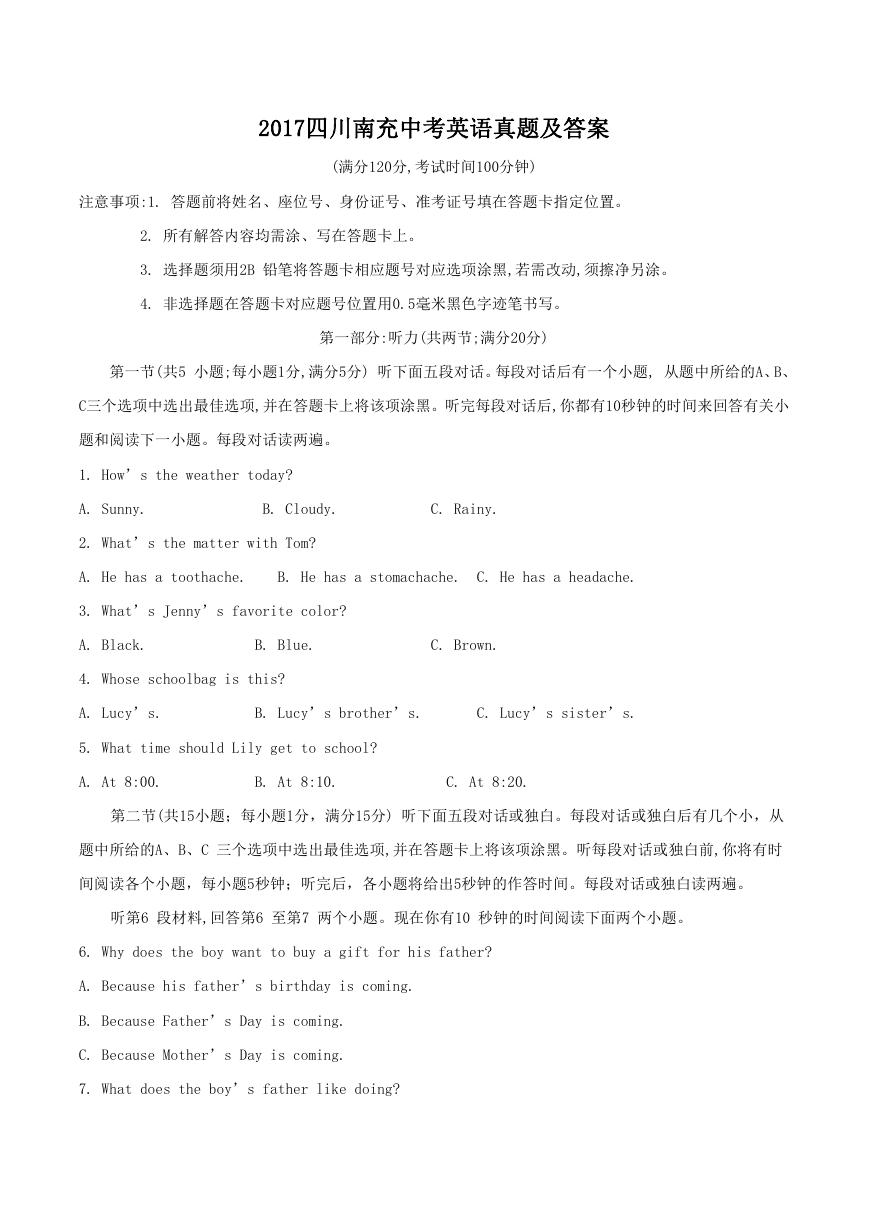
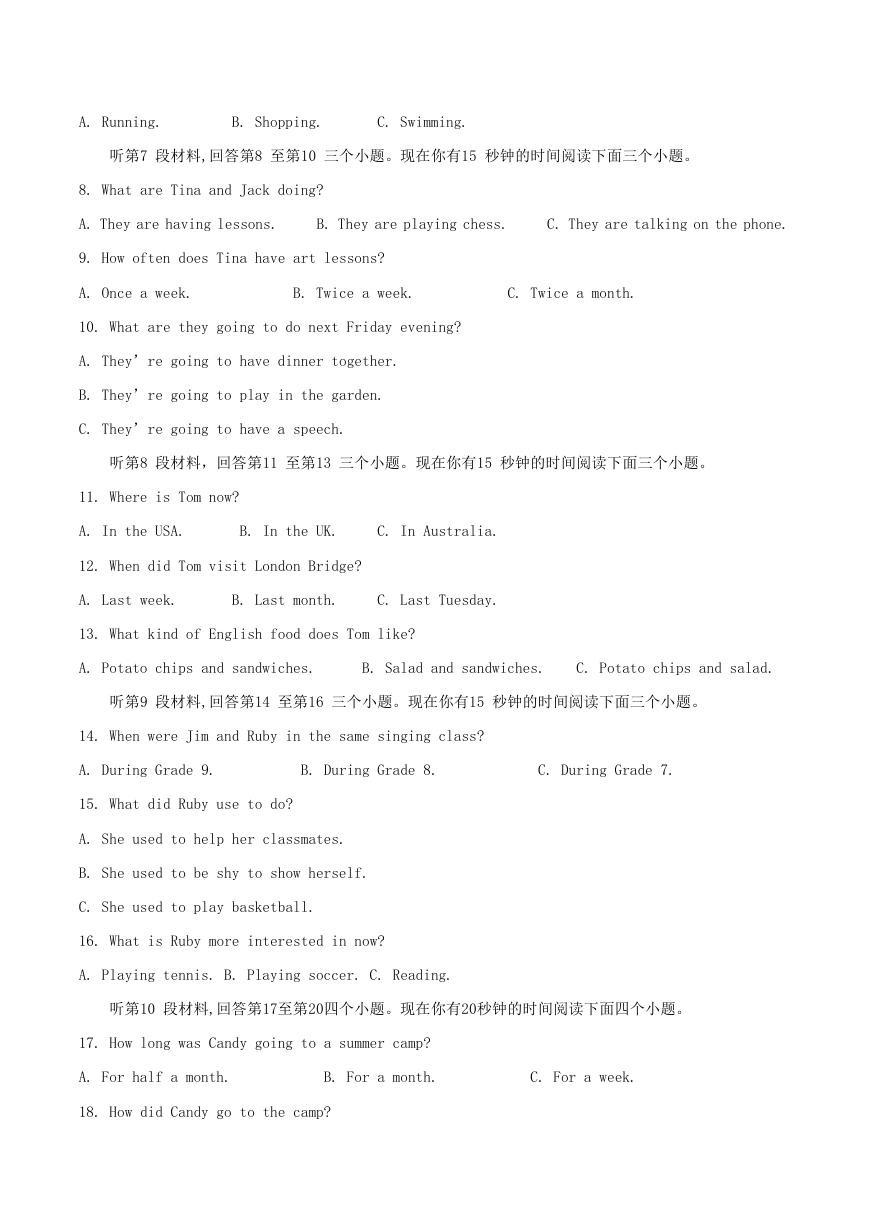

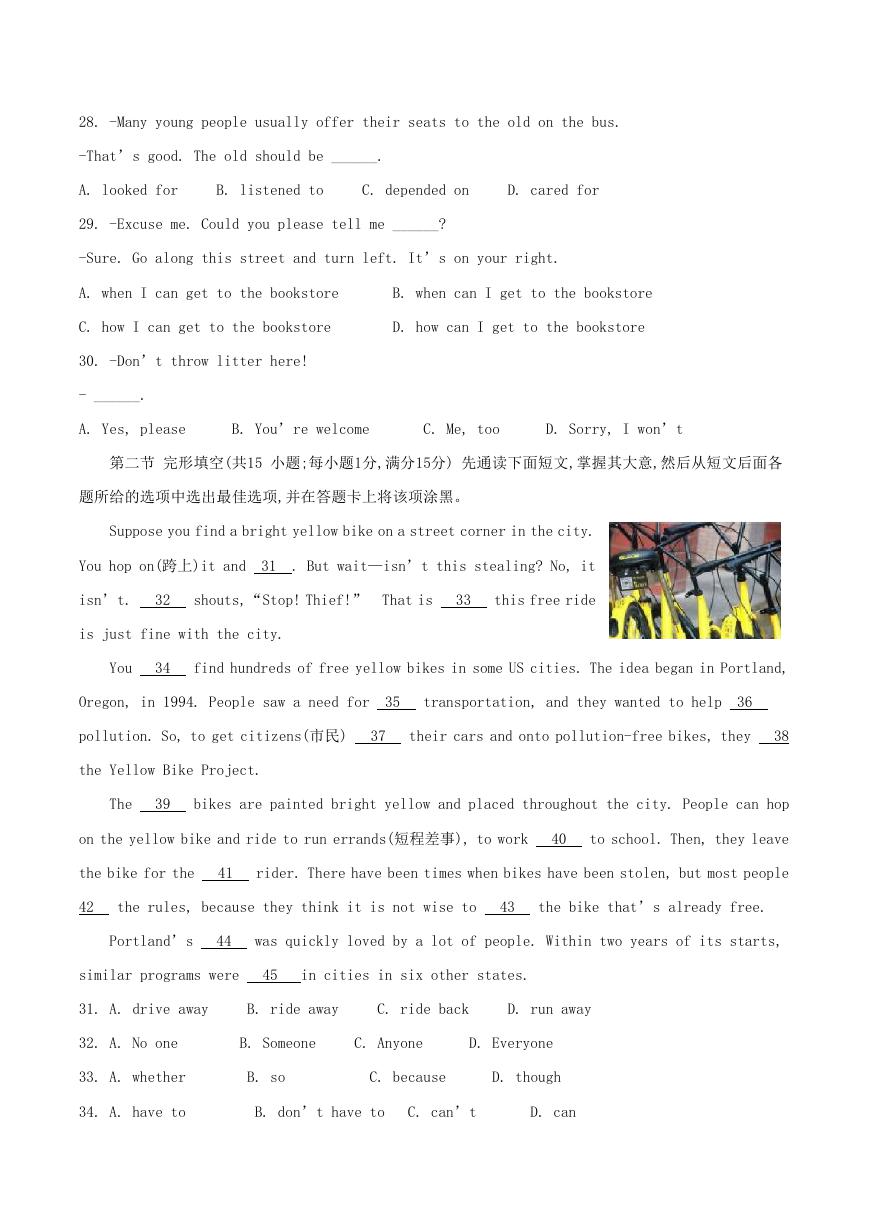
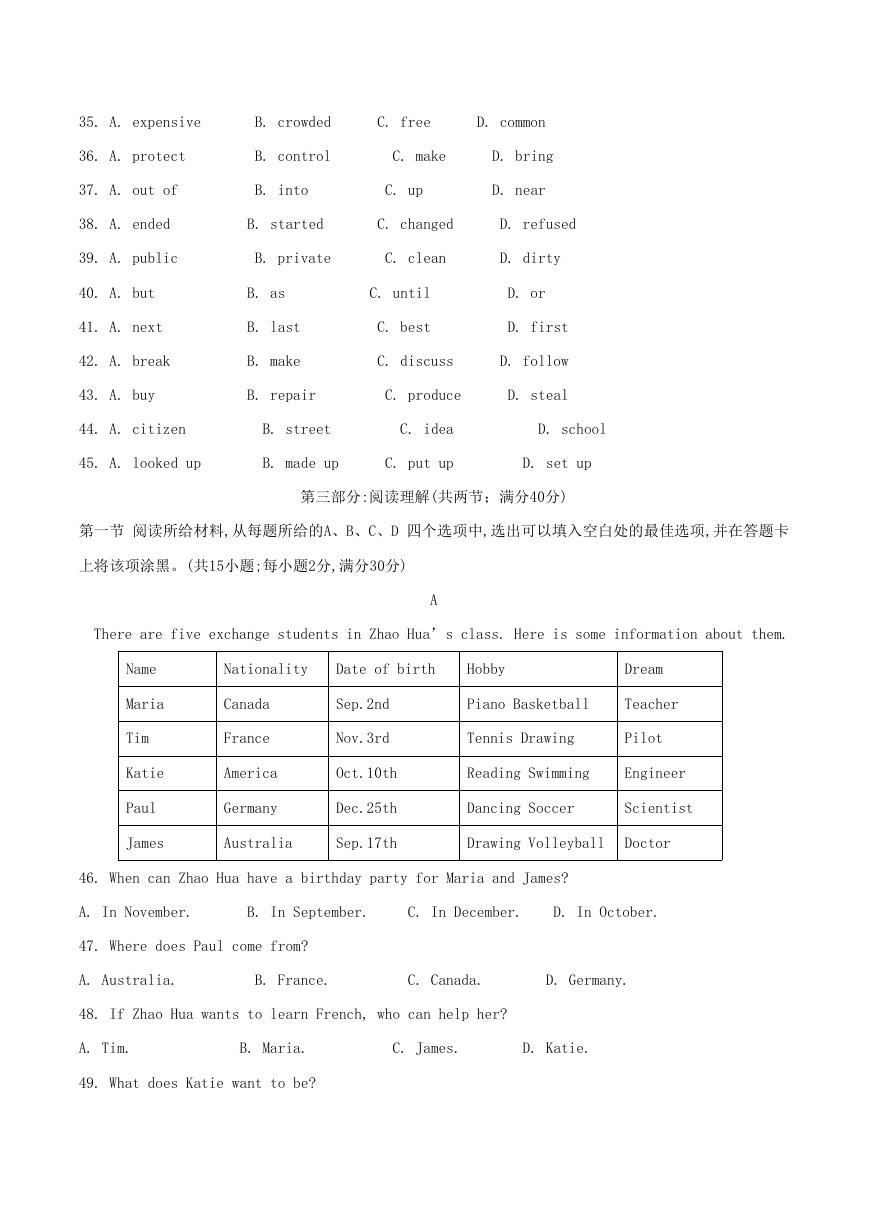
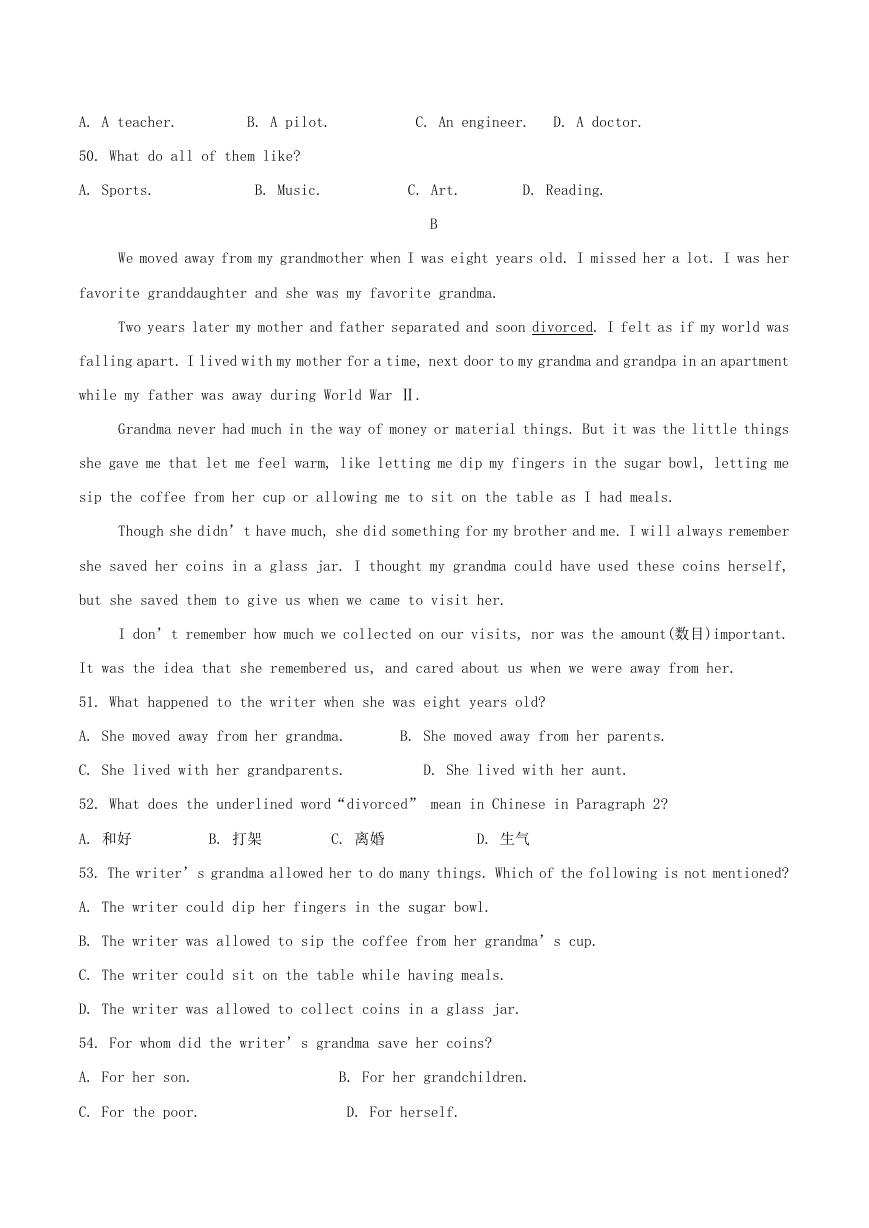
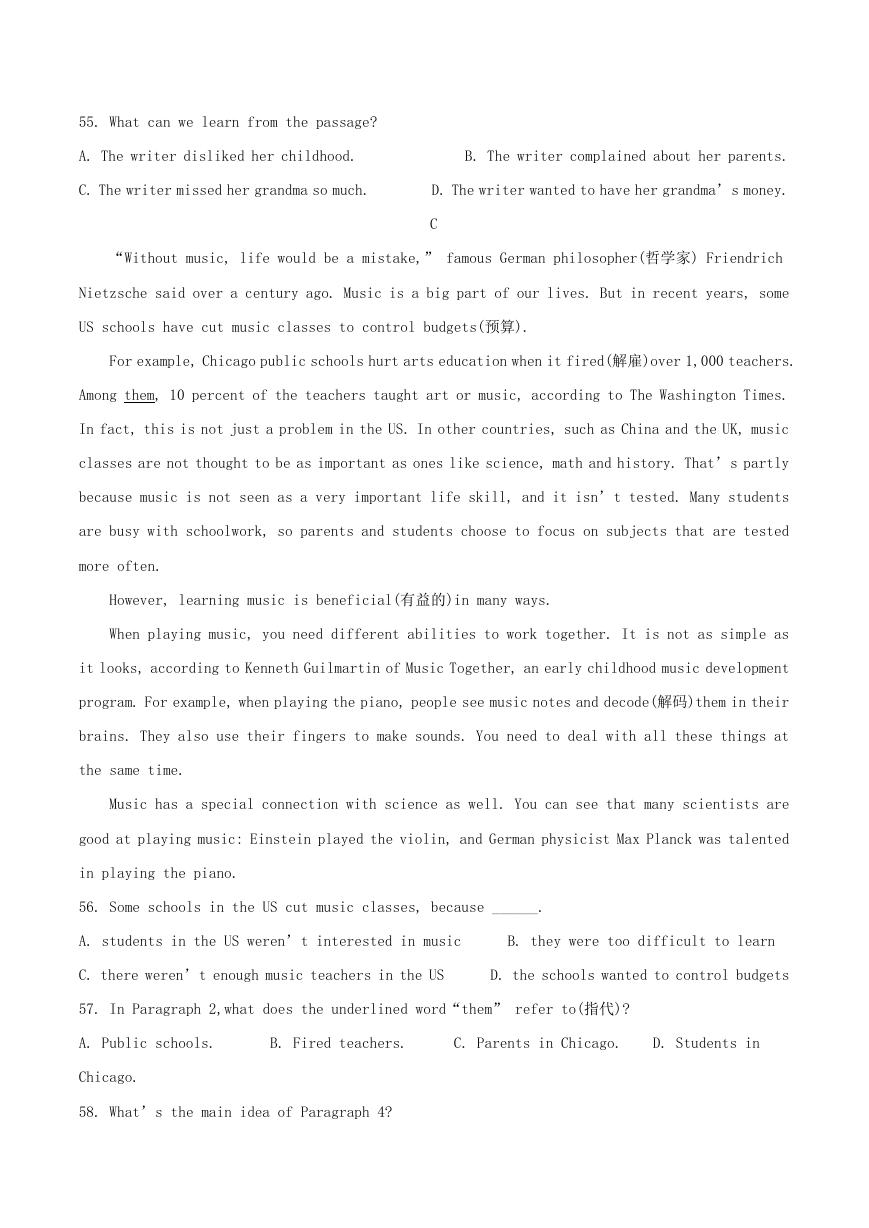
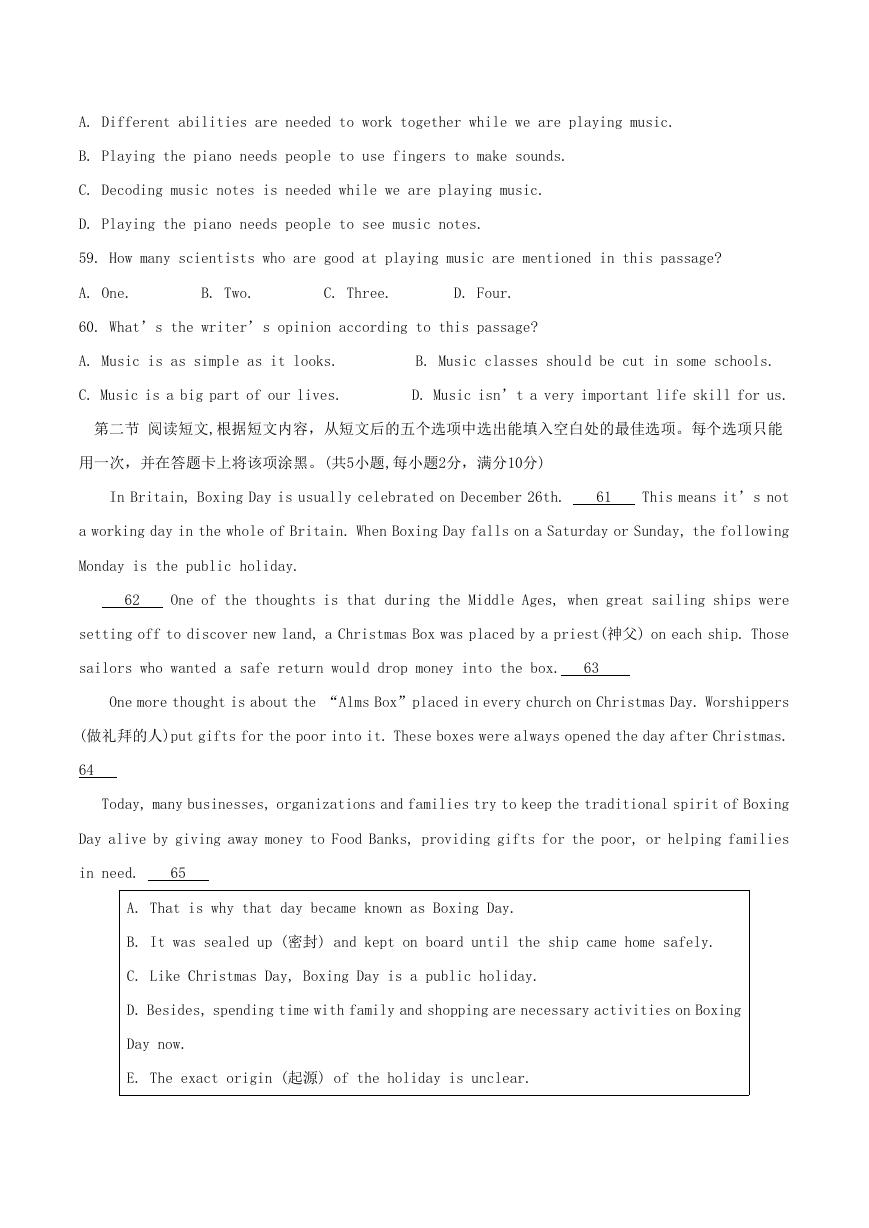








 2023年江西萍乡中考道德与法治真题及答案.doc
2023年江西萍乡中考道德与法治真题及答案.doc 2012年重庆南川中考生物真题及答案.doc
2012年重庆南川中考生物真题及答案.doc 2013年江西师范大学地理学综合及文艺理论基础考研真题.doc
2013年江西师范大学地理学综合及文艺理论基础考研真题.doc 2020年四川甘孜小升初语文真题及答案I卷.doc
2020年四川甘孜小升初语文真题及答案I卷.doc 2020年注册岩土工程师专业基础考试真题及答案.doc
2020年注册岩土工程师专业基础考试真题及答案.doc 2023-2024学年福建省厦门市九年级上学期数学月考试题及答案.doc
2023-2024学年福建省厦门市九年级上学期数学月考试题及答案.doc 2021-2022学年辽宁省沈阳市大东区九年级上学期语文期末试题及答案.doc
2021-2022学年辽宁省沈阳市大东区九年级上学期语文期末试题及答案.doc 2022-2023学年北京东城区初三第一学期物理期末试卷及答案.doc
2022-2023学年北京东城区初三第一学期物理期末试卷及答案.doc 2018上半年江西教师资格初中地理学科知识与教学能力真题及答案.doc
2018上半年江西教师资格初中地理学科知识与教学能力真题及答案.doc 2012年河北国家公务员申论考试真题及答案-省级.doc
2012年河北国家公务员申论考试真题及答案-省级.doc 2020-2021学年江苏省扬州市江都区邵樊片九年级上学期数学第一次质量检测试题及答案.doc
2020-2021学年江苏省扬州市江都区邵樊片九年级上学期数学第一次质量检测试题及答案.doc 2022下半年黑龙江教师资格证中学综合素质真题及答案.doc
2022下半年黑龙江教师资格证中学综合素质真题及答案.doc